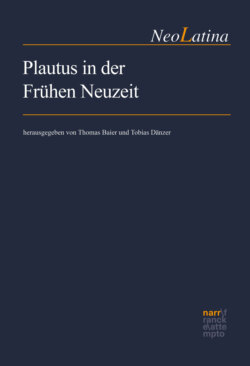Читать книгу Plautus in der Frühen Neuzeit - Группа авторов - Страница 27
7. The Czeckered past of the Decurtatus
ОглавлениеRecall that the Decurtatus had once belonged to Freising Abbey (ch. 4 above), but many of its manuscripts were carried off and dispersed in the 14th and 15th centuries.1 Because that is precisely the time HassensteinHassenstein, Bohuslaus von began amassing his collection, it is plausible to suppose – though it cannot be proven – that HassensteinHassenstein, Bohuslaus von acquired it there and then. And as I will now explain, it is also plausible to suppose CamerariusCamerarius d.Ä., Joachim had, quite coincidentally, acquired the Decurtatus only shortly before FabriciusFabricius, Georg wrote him about it.
Consider the timing. In my view, the “new edition” (recentis editionis tuae) FabriciusFabricius, Georg refers to must be CamerariusCamerarius d.Ä., Joachim’ 1549 partial edition of Plautus rather than his 1545 partial edition of Plautus. I say that because it begins with a preface dated August 24, 1549 – that is, only six weeks and a couple days before FabriciusFabricius, Georg’ letter of October 7.2 In it, CamerariusCamerarius d.Ä., Joachim writes (pp. 12–13):
[…] et nunc post priores quinque fabulas Plautinas […] nunc has alteras sex tradidimus exprimendas Valentino nostro […]. Sed ad operis perfectionem opus erit quasi Zephyri flatu quodam pacis et ocii […].
And now, after the first five comedies of Plautus […] I’ve now sent off this second batch of six to our friend Valentin [sc. Papa/Bapst, CamerariusCamerarius d.Ä., Joachim’ printer in Leipzig] to print […]. But to finish the job, I’m going to need a certain breeze of peace and quiet, as if from Zephyr.
In my view, FabriciusFabricius, Georg is echoing the words ad operis perfectionem, “to finish the job,” in writing totum illud opus […] cum videaris quam primum absolvere velle, “since you seem eager to finish the whole job off as soon as you can.”
Given the tight timeframe between CamerariusCamerarius d.Ä., Joachim’ preface and FabriciusFabricius, Georg’ letter – just six weeks – it would be natural to assume that FabriciusFabricius, Georg’ letter is what prompted CamerariusCamerarius d.Ä., Joachim to discover and go obtain the Decurtatus from the HassensteinHassenstein, Bohuslaus von library. It would also be natural to fix that moment between October 8, 1549, and 1552, when his Basel edition first appeared. That is what I assumed at first, and it is nearly what other scholars had assumed even without knowing about FabriciusFabricius, Georg’ letter. As noted above (n. 24), Zangemeister thought the 1552 edition was the first time CamerariusCamerarius d.Ä., Joachim ever mentioned the Decurtatus. And Bandini writes,
CamerariusCamerarius d.Ä., Joachim seems to cite both codices for the first time in the introduction to the 1552 edition […]. In the preface of the 1545 partial work, by contrast, he only cited B. This suggests CamerariusCamerarius d.Ä., Joachim already had possession of the Vetus codex and that it was only after that date that he also had C in his hands.3
Nevertheless, as Marion Gindhart pointed out to me, our assumption is wrong, and the reality more complicated.
In truth, CamerariusCamerarius d.Ä., Joachim first alludes to the Decurtatus in ten endnotes in his 1549 edition – that is, the same edition that prompted FabriciusFabricius, Georg’ letter.4 He refers to it, vaguely, as “the other book” or “in one copy,” but the readings he cites match or fit those of the Decurtatus. He does not cite it in his EpidicusEpidicus or BacchidesBacchides, which are the first two plays in the book, and he says nothing descriptive about it at any point.
This situation suggests CamerariusCamerarius d.Ä., Joachim edited the plays in the traditional order and did not revise his work after completing them. It also suggests that in 1548 or 1549 CamerariusCamerarius d.Ä., Joachim must have quietly gotten the Decurtatus from someone while he was editing MercatorMercator. I suspect FabriciusFabricius, Georg simply overlooked these endnotes or did not understand them, and, by sheer coincidence, sent CamerariusCamerarius d.Ä., Joachim to go find the very same manuscript he’d already taken possession of a year or two earlier.
How did CamerariusCamerarius d.Ä., Joachim get the Decurtatus? In my view, the scant use to which he put it suggests it was an unwanted gift. By 1548, he had been editing Plautus for 23 years and publishing partial results. It would not be surprising if he closed his eyes to a “white elephant” at the eleventh hour. Who would want to redo everything at that point?
Invito data, redditur albus res elephantus.
The second letter I discovered in 2017 supports that impression.
